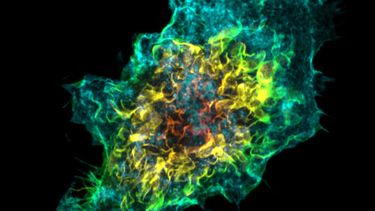The cross-disciplinary grant of £1mil for 3.5 years will allow Simon, based in Medicine and Population Health, and co-applicant Rhoda Hawkins, based in the School of Mathematical and Physical Sciences, to hire a team of two post-docs and a research technician to study a critical area of research.
Cryptococcus neoformans is a fungal pathogen that causes life-threatening cryptococcal meningitis, resulting in 1-200,000 deaths annually and is recognised by the WHO as the highest priority fungal pathogen. Individuals at-risk of cryptococcosis are increasing due to multi-morbid disease and/or polypharmacy that results in immunocompromise. Treatment of cryptococcosis is limited by availability and toxicity of anti-fungal drugs (especially in resource-limited settings).
We have discovered that macrophages use actin-based micro-ridges to bind and phagocytose cryptococci. In this project we will use cutting-edge multi-disciplinary experiments in molecular cell biology, immunology and theoretical biophysics to understand how ridges increase the phagocytosis of cryptococci and how ridges might be targeted as a new therapy for cryptococcal meningitis.
Simon Johnston

